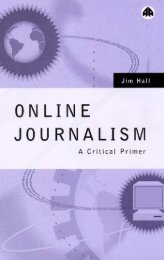Modul Mata Kuliah Journalisme Online - Ayo Menulis FISIP UAJY
Modul Mata Kuliah Journalisme Online - Ayo Menulis FISIP UAJY
Modul Mata Kuliah Journalisme Online - Ayo Menulis FISIP UAJY
Create successful ePaper yourself
Turn your PDF publications into a flip-book with our unique Google optimized e-Paper software.
Frequently Asked Questions:<br />
How do you decide what to link to in the work you publish online?<br />
We start by asking the questions listed in the publishing protocol above. The linking decision requires<br />
more specific considerations, including the relevance and reliability of the material that might be linked.<br />
The decision to link or not -- especially to controversial content that the audience could find on its own -<br />
- creates an opportunity for explanation and discussion. Linking decisions should be based on serving the<br />
audience with as accurate and as complete a picture of the world as possible. Such decisions should not<br />
be limited by commercial concerns about sending customers to others' sites.<br />
When is it appropriate to publish material that has not been reviewed or edited?<br />
Decisions about when to edit -- and how much -- are best made along a risk/benefit scale that includes<br />
such considerations as the nature of the information, the relative importance of speed versus accuracy,<br />
the relative importance of quantity vs. quality of the material to be published, the availability of<br />
resources, and the skill, experience and track record of the person producing the content. Just as live<br />
shots increased the likelihood of unedited content appearing on television news broadcasts, various<br />
digital formats now emerging will create platforms for content subjected to a range of editing - from<br />
none to rigorous. Whatever level of editing is applied, the variety of new platforms underscores how<br />
important it is for publishers to communicate clearly just what level of editing has been applied.<br />
Why would you ever allow people to publish something without their real identity attached to what<br />
they say?<br />
There are times when withholding the full name of an author could serve a useful purpose. A news<br />
organization might publish unsigned editorials in an effort to express a view meant to represent that of<br />
an entire editorial board. A civil servant adding a comment to a blog might sign only as Ticked Off in<br />
Tallahassee in order to add useful information to a political debate without jeopardizing his or her job.<br />
Even more significant is the need to provide protected anonymity to whistle blowers whose information<br />
can be independently verified. For the most part, though, it's difficult to make the case that the<br />
credibility of anonymous content can ever match that of material whose author is known. As journalists,<br />
our default position is to publish material only with full names attached. We make exceptions only in<br />
rare cases, only for compelling reasons, and only with explanations attached explaining the reason for<br />
the anonymity. (2/5/07 update: There is significant disagreement among participants about the topic<br />
of anonymity, including sharp disagreement with the paragraph above. See, in particular, Steve<br />
Yelvington's thoughtful essay on anonymity in a recent issue of Nieman Reports. We hope revisions to<br />
the accompanying Wiki will reflect additional perspectives on the issue.)<br />
How do you decide when a user should be banned from publishing on your site?<br />
This question raises a fundamental tension for journalists working in digital media: the need for a news<br />
organization to accommodate conflicting views at the same time it creates and maintains a community
















